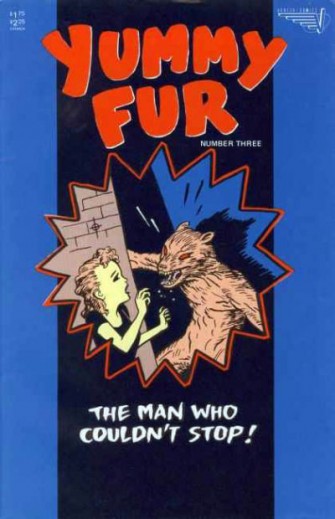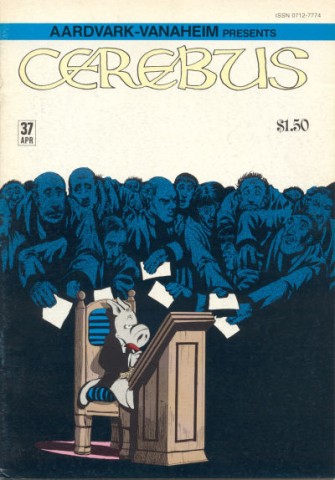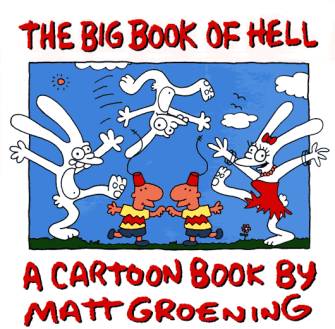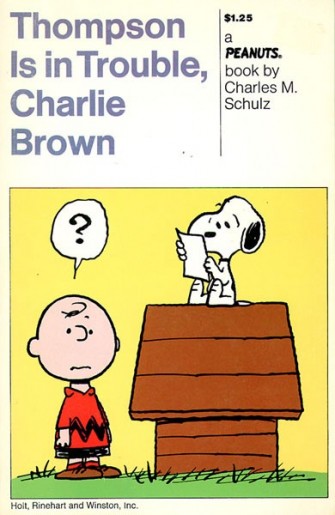
October 11, 2009
 Five Truths I Hold About Comic Books That Might Not Be Truths At All
Five Truths I Hold About Comic Books That Might Not Be Truths At All

 By Tom Spurgeon
By Tom Spurgeon
If you write about a certain subject relentlessly, theories of same roll into and out of your life like so many failed relationships. I'm dating one right now. It says a significant contributing factor to North American comics culture is that a single, broadly-defined but still recognizable generation shattered the cycle that existed in comics' first several decades and acted as the primary audience for comics from their early teens into their 40s. That doesn't mean there aren't comics readers of all ages, but that the primary audience for same and their collective expectation for how things should was in almost all cases conceived of as a group of folks born between 1965 and 1975. I haven't really figured out what that means, or even if it's accurate, but it's a thought that's in the back of my mind and finds frequent expression in my current writing.
It also set me to wondering how much of my own views on comics are generational, specifically controlled by my own experience despite my efforts to see things as rationally and from the ground up as possible. Even if I do a good job of trying to see thing with fresh eyes, what are my stickiest comics biases? I came up with five that influence me whether I like it or not. You may recognize yourself in some of them as well.
 1. I don't covet the comics of my youth, I covet the comics from just before my youth.
1. I don't covet the comics of my youth, I covet the comics from just before my youth.
This is hard to understand for people that came to reading mainstream superhero comics in the graphic novel age, but there was a time when if you were a comics reader you could rattle of a bunch of numbers that were basically your starting points in the Marvel and DC Universes. This was more than a nostalgic nod as to when you first started to get involved in comics the way I think such numbers function for people now. No, these were almost like your awakening points, your second birthdays, your baseline for understanding the universe put in front of you beyond the limited number of reprints you might get to see if your quarters held out. They were your limits. With a kid's allowance and the limited opportunities to find and buy the items in question, your jumping on points were also the parameters of your cage.
Because superhero comics book became increasingly self-referential in the 1970s, to a severe degree in fact, right down to their bones, something that happened just out of sight took on extremely romantic, desirable dimension. The end result is that I was happy to collect
the Celestial Madonna storyline in
Avengers, but what I really wanted was to read about something I kept hearing about called
the Kree/Skrull War. I enjoyed
the new X-Men, but are you kidding me these old X-Men
once had their own comic and it had Neal Adams art...? The 1970s were generally envisioned as a wasteland. A popular message of youth culture is that you had missed out on everything worthwhile: it's the fertile soil from where expressions like classic rock and the initial wave of VCR owners found their reasons to be. So too with comics. Reading comics back then was like constantly being in the room were people were talking about stuff that happened and the only thing that was keeping you from having these blissful, secret experiences was a bit of money and a penchant for follow-through.
I best most fans of these giant serials have some sort of impulse along these lines, but for kids of a certain age this impulse was met with a fractured market enough to challenge anyone's limited exposure to the world. Comic shops are a wonderful thing, but a lot of today's most devoted fans had initial experiences dominated by severe scarcity, going to garage sales in blind fashion just in case there was a basket of old
Conan comic books, biking to the flea market to find the guy with the clipped-out, framed Frazetta magazine drawings and the box of
Rawhide Kids. I just wanted to be fully clued in, to read the rest of the story. And it lingers. I still have a soft spot for any comic that costs $.15, despite decades of accrued knowledge that should have blasted that feeling from existence. Not only that, but I think that as much as it's conventional wisdom how creators want to re-make the comics of their youth, we also define too narrowly and fail to see how creators treat comics just out of their touch with a reverence and power that on their own they might not deserve. Many of the best comic book writers of today started out extending the themes and approaches from the comics they read as teens. It's when they go back further to the ones that they experienced as children, or only heard about, that things have become deeply imaginative and weird.
Our desire to rekindle a sense of wonder in forges left cold for decades can be stifling enough, that we want to recapture oh-so-specific dreams dreamed for us by someone else runs close to tragedy.
 2. Whether or not there are comics for kids, I still want comics to function as a pastime for a child.
2. Whether or not there are comics for kids, I still want comics to function as a pastime for a child.
This one's easy, but it was a huge blind spot for years. Although I quickly stopped wanting the comics I enjoyed as a 12-year-old to function in a way I could enjoy them as a 16-year-old or heck, name your age, I know that for a lot of fans this is something they hold onto for a long time. Comics fans tend towards wanting their new comics to be the same or to recall the qualities that allowed that young person they once were to enjoy them as an echo of an experience from years aback. As a group, longtime comics fans can't really wrap their minds around the fact that what they hate about certain comics might be corned beef hash with a perfect, sunny-side up egg on top to someone that's not them. Occasionally, I like to make fun of these people.
What's a little humiliating about that is that I have my own bias, which is that I over-value the way I experienced comics, if not the comics themselves. I romanticize the furious hunt that came before comics shops (see #1), and I put an extreme amount of value on the relationship I had to comics for about five or six years as a teenager. That relationship was I would go to the comics shop on new comics day -- because I lived in a town small enough the shop occasionally used a sub-distributor this changed a lot -- I would buy a small stack of comics with shared money from my brother and myself, this would include some independent comics but also some high-end mainstream comics (they were cheaper than black and whites back then, so keeping your hand in mainstream comics gave you a bigger stack of comics to read), and while it wasn't cheap it didn't leave me totally bankrupt for the weekend ahead. Then I would go home and spend about two hours absorbed in the variety and range of worlds and artistic expressions laid in front of me, revisiting the best ones for about another hour later in the week.
I'm sure that young readers still get lost in the material they read, whether they have the trust funds I'd imagine it would take to follow pamphlet-style comics these days, or if they borrow them from the library, or if they secure them in trade form from Barnes and Noble. But I don't always act as if they do, favoring my own experience over any others with a distressing and unearned absolute quality. And while I do think there are advantages to cheap entry points and having a variety of experiences clamoring for your attention as opposed to companies rushing to give you approximates of the best-selling one or two kinds of books over and over and over again, I'm not sure that I always make the case fairly, trusting my own very satisfying reading experience filtered through a prism of nostalgia. This is exactly the kind of thing that when applied to content rather than process I love to make fun of fans for doing. I know there's no going back to what was in the brown paper bag every week from 1982 to 1986; I need to give up the rest of it, too.
 3. I over-trust the serial.
3. I over-trust the serial.
This one probably goes without saying, in part because it's obviously related to the last point. I grew up reading serial comics in the newspaper and at the spinner rack. I later took the latter habit into the comic shop. While I was always a fan of comic strip collections and was there to slowly discover graphic novels and have read dozens of amazing works each way, it's nearly impossible for me to wrap my mind around a comics experience dominated by original works over serialized works. I can do it intellectually, but I'm not sure I can do it emotionally. I still see the comic books as the real unit, no matter how many of my peers' bookshelves are filled with collected versions. More importantly, I can't shut that acceptance of the older form out and really see the opportunity for reading comics that way. When someone says they couldn't stand to read
Blankets in serial form, I have no problem imagining this. Serial comics is my default mode.
At least in this way I think I'm pretty typical of a lot of people in comics, who are buoyed by the dependability of profit models in newspapers, with manga's original publication overseas, with album series in France and of course American mainstream comics. It's been an advantage when dealing with those who are trying to find different models mostly by yelling about it really loud and making grampa jokes to have a gut instinct that suggests looking at the bottom line before advocating for widespread change. I'm certain that for many serial comics advocates that belief becomes a liability, and I'm not sure which side of the line I'm on.
 4. I distrust a social component for comics.
4. I distrust a social component for comics.
Like many devoted North American comics fans, I read comics mostly by myself for years and years. My friends certainly read my comics, and my brothers shared in them, but I think all of them were taking advantage of comics' proximity through me more than they might have been exercising their own tastes and desires. One thing I've never quite been able to rectify is how much people like comics -- whether it's kids in my bedroom waiting for the beer to show up all reading issues of
Zot!, or college students swiping our house's copies of
Life In Hell books from the back of the john, or a summer break as a young adult when on a rainy day at a lake house folks took turns devouring issues of
Yummy Fur -- with the fact that this never inspires them to take that next step and enjoy them on their own. Anyway, I was never lonely as a young person, and certainly no one looked down on my odd hobby, but I was kind of on my own when it came to my exploration into comics the way I never was with music or movies. R. Fiore was a bigger player when it came to my interest in funnybooks than all of my friends growing up.
I wonder after the effects of this. Sometimes I wonder if people in comics make such a high percentage of friends out of other people in comics because they get sick of not being able to tell anyone their Keith Pollard jokes. I know that being able to talk through those kinds of topics was a hugely attractive part of my own working at Fantagraphics in the mid-1990s. These days I'm more interested in how the comics corner of the Internet and its level of social interaction is determined by the solitary habits of a previous generation of comics fans. Not only must it be odd to be able to jump on-line and share words with the guys and gals who made the comic book you just read, but I wonder if that acts as the second part of an experience that those of us who came aboard before the early 1990s had no choice but to try and fill with more comics. If there had been an X-Men chatroom in the early '80s, would I have felt the need to try the books published by Capital? The few comics readers I knew growing up used to kid that the difference between a comics convention and a science fiction convention is that you needed comics conventions to find more comics and at other conventions they dressed up in costumes hoping there was something more involved that way. I think I still look at the world that way, and I wonder how unsympathetic it leaves me when trying to see different way to envision the art form.
 5. I expect everything in comics to last forever.
5. I expect everything in comics to last forever.
I hadn't realized that I was biased towards the conception of comics as forever -- in the sense that Superman and Batman and Wonder Woman are forever -- until the late 1990s as companies flailed for survival in the vise created by lousy and short-sighted business decisions from Marvel, DC and Image. When Fantagraphics was in severe trouble, for example, I was worried for myself but also for my considerable rooting interest in the company. I dreaded most of all having to face its usual crew of critics who would of course delight in the company's failure, consider it a win for their side, and subject the publisher's departure to a bigger and more thorough razzing than that which had greeted Kitchen Sink Press from some of the same sources.
Yet the more I thought about such company closures, the more I wondered at what standard of measure I was using that depicted companies that lasted decades and published hundreds of qualities books and had been so meaningful to so many people for long could be termed a
failure? Surely a couple of decades of swimming against every current out there is an achievement rather than failure because it failed to last into a fourth decade? Then I figured it out: I was employing a standard where the culturally ubiquitous Superman and its hundreds and hundreds of issues of
Action Comics and related titles was the accepted ideal. While I had always rejected the crass measurements that so many people in comics used that were basically cultural versions of the Thing vs. the Hulk, here I was applying a variation of my own.
The perniciousness of this bias struck me recently when I saw an article on "Classic Avengers" vs. "Bendis Avengers" and through it entertained the notion that there are some fans out there that to varying degrees considered a specific line-up of muscled superheroes to be the correct way to bring into some creative reality a really loose concept with thousands of possible variations. They did so for the simple reason, I think, that they had always been catered to with that particular solution. This is sort of like expecting Terry Bradshaw to still be quarterback of the Pittsburgh Steelers, or for all your friends to still be just as excited about a new RUSH album the way they would have been in 1985, or for Walter Cronkite or someone looking like him to be hosting the CBS News.
When a few folks have recently looked at the failure of properties from a quarter-century ago, or even artists from a quarter-century ago, to find their proper place and blame the marketplace for being broken in some way, I have to wonder if this isn't the measure of Superman and Charlie Brown seeping its way in. Artists have a time and then most find less favor in the marketplace -- one of the reasons their contracts and deals have to be just and honest and fair in the first place. I think it's hard for readers like me to let go of the fact that certain creators we enjoyed, certain comics we loved, are lost to us in the way that we loved them. I think it's easy to point at one hundred ways the industry functions based on that sort of measure, when it's the brief and fleeting and the single volume that are more precious and worthy of our attention.
posted 2:00 pm PST |
Permalink
Daily Blog Archives
November 2019
October 2019
September 2019
August 2019
July 2019
Full Archives


